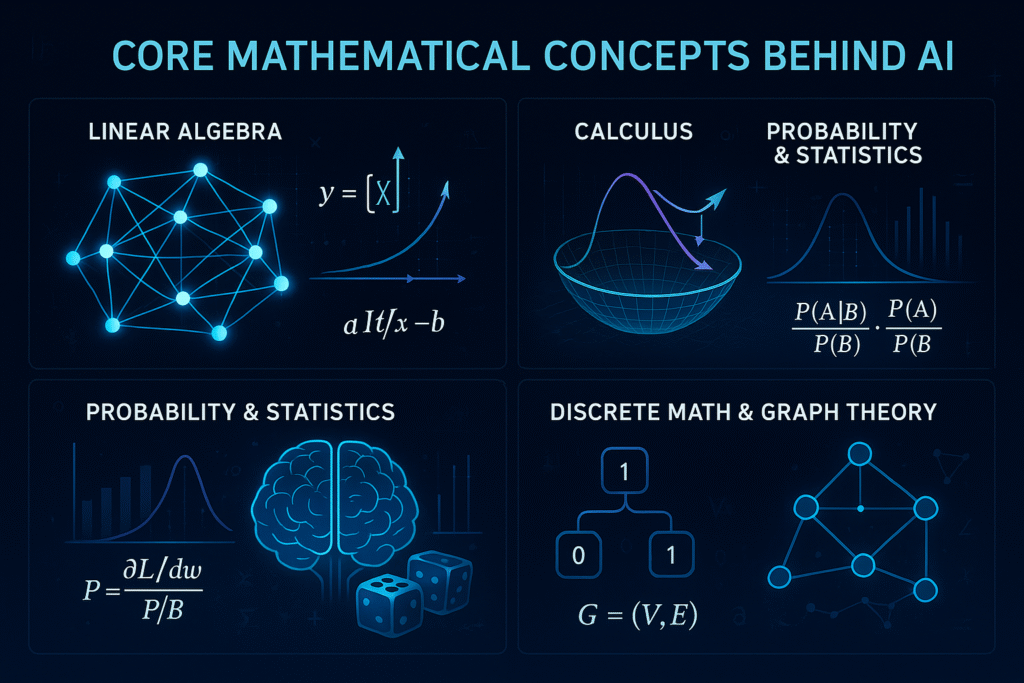Artificial intelligence mathematics reveals a groundbreaking shift. Modern tech is changing how we do math, making it more advanced. Companies like Google and IBM are leading this change, improving how we solve problems with artificial intelligence mathematics.
This article will explore how AI is changing math. We’ll look at the exciting possibilities for the future of mathematics with AI.
This article will explore how artificial intelligence mathematics is changing math. We’ll look at the exciting possibilities for the future of mathematics with AI and artificial intelligence mathematics.
The Intersection of Artificial Intelligence and Mathematics
The mix of AI and math is creating big changes in many areas. It’s amazing how AI uses math to make better predictive models and analyze data. Places like MIT show that strong math is key for AI’s success, leading to new discoveries.
The mix of AI and artificial intelligence mathematics is creating big changes in many areas. It’s amazing how AI uses math to make better predictive models and analyze data. Places like MIT show that strong math is key for AI’s success, leading to new discoveries in artificial intelligence mathematics.
Looking at the work done together in AI and math, I see that math helps AI grow and vice versa. This back-and-forth helps solve tough problems, like tasks that were thought impossible. AI’s skill in tackling these issues shows how important math is for AI’s progress.
Looking at the work done together in AI and artificial intelligence mathematics, I see that math helps AI grow and vice versa. This back-and-forth helps solve tough problems, like tasks that were thought impossible. AI’s skill in tackling these issues shows how important math is for AI’s progress in artificial intelligence mathematics.
How is Math and AI Connected?
The bond between math and AI is deep and vital. When I think about how math and AI are connected, I see math as the backbone of AI. It’s the math that guides AI’s methods and powers its learning and data analysis.
Machine learning uses calculus and probability to predict and make choices. These math areas give AI the tools to work with data. Statistics is key for understanding big data, helping AI grow and improve.
AI models like neural networks and decision trees rely on math. Neural networks, for instance, use complex math to learn and adapt. Knowing the math behind AI helps us make these models better and use them in many areas.
In short, math and AI are in a cycle of growth. Math helps AI get better, and AI finds new math problems to solve.

Essential Mathematical Concepts for AI
Understanding the math behind AI is key for anyone interested in artificial intelligence. Linear algebra is a must, as it helps in working with data. It’s all about representing and manipulating data in multiple dimensions, crucial for AI.
Understanding the math behind artificial intelligence mathematics is key for anyone interested in artificial intelligence. Linear algebra is a must, as it helps in working with data related to artificial intelligence mathematics.
Calculus is also vital, acting as a foundation for optimizing AI algorithms. It helps me see how changes in inputs affect outputs. This knowledge is essential for creating effective AI models.
Probability is another critical concept. It’s important for making decisions when things are uncertain. Mastering these ideas helps me innovate and succeed in AI.
Artificial Intelligence Mathematics: Building Blocks for Innovation
Mathematical modeling in AI is key to many innovations. It helps create algorithms through methods like optimization and statistical learning. These are vital for AI’s growth. For example, Tesla uses these math tools to make self-driving cars.
Mathematical modeling in artificial intelligence mathematics is key to many innovations. It helps create algorithms through methods like optimization and statistical learning. These are vital for AI’s growth. For example, Tesla uses these math tools to make self-driving cars based on artificial intelligence mathematics.
Financial modeling is another area where math plays a big role. Companies like Amazon use math to improve logistics and supply chains. This shows how important AI’s building blocks are in analyzing and predicting data. As AI technology advances, we can expect more breakthroughs thanks to solid mathematical models.
Advantages of Learning Math for AI
Learning math is key for a career in AI. Skills in algebra, calculus, and statistics are crucial. They help in solving complex problems and developing AI algorithms.
Math also boosts logical thinking. This is vital for tackling AI challenges. It ensures that algorithms are optimized for better performance.
Math goes beyond solving problems. It’s essential for understanding AI data. Without it, interpreting AI results is hard. A strong math background also improves analytical skills.
Math is vital for AI work. It teaches algorithmic thinking. This skill is essential for breaking down big problems into smaller ones.
Math is vital for artificial intelligence mathematics work. It teaches algorithmic thinking. This skill is essential for breaking down big problems into smaller ones involving artificial intelligence mathematics.
In summary, math is crucial for AI experts. It shapes their ability to solve problems and improve algorithms. This makes math a fundamental skill for AI professionals.
3 Math Concepts to Learn for AI
Exploring artificial intelligence, I’ve found that learning 3 key math concepts is crucial. Linear algebra is the first must-learn. It’s vital for many AI tasks, especially in neural networks. Knowing how to work with matrices helps me handle data well, making predictions more accurate.
Calculus is the second essential math for AI. It helps me tweak algorithms to reduce errors in predictions. Understanding gradients is key to improving model accuracy.
Probability is the third critical math concept. It’s vital for making decisions when information is uncertain. This skill lets me estimate the chances of different outcomes, using what I already know.
Future Trends in Artificial Intelligence Mathematics
As I watch the world of artificial intelligence mathematics grow, I see new trends in AI math. Quantum computing is becoming a big deal. It gives computers the power to solve complex problems that were once impossible in artificial intelligence mathematics.
As I watch the world of artificial intelligence grow, I see new trends in AI math. Quantum computing is becoming a big deal. It gives computers the power to solve complex problems that were once impossible.
New math methods in AI, like advanced probabilistic models, are changing how we use data. These methods help machines make better predictions. This is especially useful in finance and healthcare.
Using new math in AI is key to making systems smarter. I think these advancements will help AI learn faster and better. This will make AI more useful in many areas, making things more efficient.
Implications of AI on Mathematical Research
Artificial intelligence has changed how I do my math research. It has big effects on how we solve problems. Before, we had to do lots of manual work or spend years on theories. Now, AI helps us look at big data, finding new insights we couldn’t see before.
AI is great at finding patterns in data. It works with us to find new ways to solve old math problems. This teamwork makes research faster and more accurate. It’s opening up new ways to understand math.
As AI gets better, it brings together theory and practice in math. It’s making research more dynamic and collaborative. I’m looking forward to seeing how it changes our field, making research more exciting and collaborative.
Conclusion
In this article, I showed how artificial intelligence changes mathematics. It brings a new era of innovation and discovery. The story of AI and mathematics is one of progress, where advanced algorithms and math are key for AI success.
In this article, I showed how artificial intelligence mathematics changes mathematics. It brings a new era of innovation and discovery. The story of AI and artificial intelligence mathematics is one of progress, where advanced algorithms and math are key for AI success.
Looking ahead, AI and math together are not just a trend. They are crucial for many advancements. Understanding math well helps us make big strides in AI. This knowledge opens up new chances in AI research and development.
Finally, I urge everyone to keep learning about this important area. The future of AI and math will bring exciting discoveries and new uses. By embracing this combination, we stay ahead in innovation and unlock future possibilities.
Finally, I urge everyone to keep learning about this important area of artificial intelligence mathematics. The future of AI and math will bring exciting discoveries and new uses. By embracing this combination, we stay ahead in innovation and unlock future possibilities in artificial intelligence mathematics.
FAQ
Q: How is math and AI connected?
Math and artificial intelligence mathematics are closely tied. Mathematical concepts are the base for AI algorithms. Machine learning, a key AI tool, uses calculus, linear algebra, and probability to work well in artificial intelligence mathematics.
A: Math and AI are closely tied. Mathematical concepts are the base for AI algorithms. Machine learning, a key AI tool, uses calculus, linear algebra, and probability to work well.
Q: What are some math concepts vital for AI?
A: Important math for AI includes linear algebra, calculus, and probability. Linear algebra helps with data handling. Calculus is key for algorithm optimization. Probability aids in making decisions when things are uncertain.
Q: Why should I learn math for AI?
A: Learning math for AI has many benefits. It boosts logical thinking, problem-solving, and analysis. These skills are vital for complex AI tasks, better data understanding, and algorithm insight.
Q: How does linear algebra apply to AI?
A: Linear algebra is vital in AI, especially for data handling. It makes neural networks work better. This is crucial for tasks like image recognition and natural language processing.
Q: What role does calculus play in AI?
A: Calculus is key in AI for optimizing algorithms. It’s used in gradient descent to improve model performance. This is essential for AI systems to work efficiently.
Q: How does probability contribute to AI systems?
A: Probability is crucial for AI to make predictions and decisions. Bayesian inference uses probability to update beliefs about data. This makes AI more adaptive and intelligent.
Q: What are the implications of AI on mathematical research?
A: AI is changing mathematical research. It helps solve complex problems faster. AI’s ability to handle large datasets leads to new theories and validates existing ones.
Q: What future trends should I watch in AI mathematics?
A: Watch for advancements in quantum computing and new probabilistic models. These will change AI system development. Innovations in deep learning and reinforcement learning will impact healthcare and finance.

